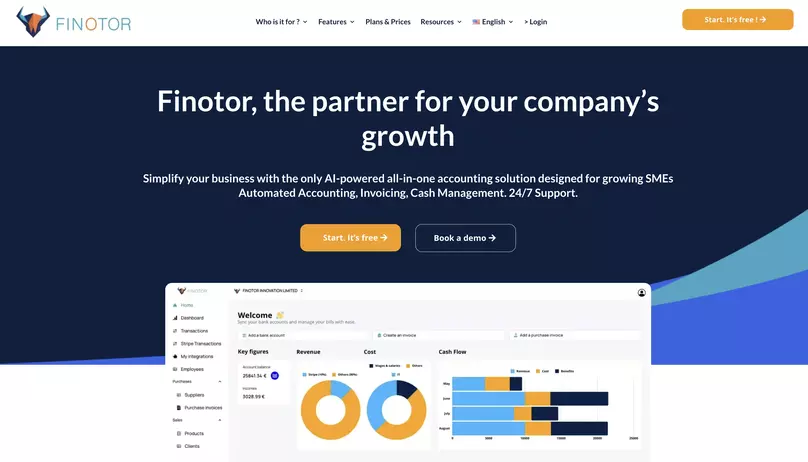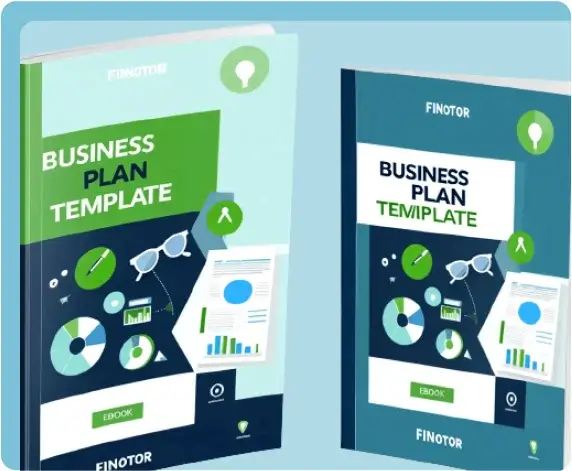Contents
- 1 Benefits of using enterprise accounting software
- 2 Features to consider when choosing enterprise accounting software
- 3 Top 5 enterprise accounting software solutions
- 4 Case studies of companies that have successfully implemented enterprise accounting software
- 5 Tips for implementing enterprise accounting software effectively
- 6 Conclusion and final thoughts
- 7 Frequently Asked Questions
Enterprise accounting software like Finotor is a specialized tool that helps businesses control their financial processes and transactions. An accounting software simplifies complex accounting tasks by automating them, boosting financial and operational data accuracy and efficiency. The global accounting software market is very important.
Benefits include:
- Robust reporting capabilities, helping organizations generate comprehensive financial statements that give insights into their financial status.
- Tracking and managing accounts payable and receivable, plus automating payment processing, invoicing, and reconciliation to reduce manual errors and delays.
- Budgeting and forecasting activities, with real-time financial data visibility for informed decisions.
- Integration with other business systems like ERP and CRM for seamless data exchange.
- Improved compliance with regulatory requirements, with accurate records and audit facilitation to reduce non-compliance penalties.
In addition, enterprise accounting software is customizable and scalable, allowing businesses to expand without outgrowing their accounting system. To make the most of it, consider implementing it for your organization. Utilize its advanced reporting capabilities to gain valuable insights.
Automate accounts payable/receivable operations to streamline cash flow and expense management. Leverage budgeting and forecasting functionalities for better planning in a dynamic business environment. Unlock the true potential of enterprise accounting software for your business success!
Benefits of using enterprise accounting software
Enterprise accounting software has numerous advantages. It streamlines processes, ensuring accuracy and efficiency. Plus, it gives real-time insights, so businesses can make informed decisions quickly.
Automating tasks such as invoicing and payroll management saves time and reduces errors. Data security is improved too, by storing info in a secured location with controlled access. This software significantly improves financial management.
Utilizing this accounting software has many benefits. Reports and dashboards can be customized, giving companies valuable insights into their financial performance. This helps stakeholders make data-driven decisions for long-term growth.
Adopting enterprise accounting software supports scalability. It provides tools to accommodate business expansions without any hassle. As an organization grows, the accounting software integrates and easily adapts to new demands.
The concept of enterprise accounting software began in the 1980s. As technology advanced, so did the software. They evolved into sophisticated platforms, integrating various functions like general ledger management, accounts payable/receivable tracking, and financial analysis tools.
Features to consider when choosing enterprise accounting software
When selecting enterprise accounting software, there are several key factors to consider. Firstly, the business accounting software should have robust financial reporting capabilities, allowing for accurate and up-to-date financial analysis.
Additionally, it is essential to choose software that integrates seamlessly with other business systems, ensuring efficient data transfer and reducing the risk of errors. Lastly, security features such as data encryption and user access controls should be prioritized to protect sensitive financial information.
Considering these features will help businesses make an informed decision when choosing enterprise accounting software.
In choosing enterprise accounting software, three crucial points should be kept in mind. Firstly, the software should have advanced automation features to streamline processes and increase efficiency. This includes features such as automatic data entry, bank reconciliation, and invoice management.
Secondly, scalability is important, as the software should be able to accommodate the growing needs of the business. This includes handling higher volumes of transactions and multi-entity management. Lastly, customization options are vital to tailor the software to the specific needs of the business, allowing for greater flexibility and adaptability.
In addition to the aforementioned features, it is important to consider the accessibility of the software. Cloud-based solutions provide the advantage of anytime, anywhere access, allowing users to work remotely or on-the-go without restrictions.
Furthermore, responsive customer support and training resources are essential to ensure a smooth transition and ongoing support.
A true history related to the selection of enterprise accounting software involves the evolution of accounting technology. In the past, businesses relied heavily on manual processes and spreadsheets, which were time-consuming and prone to errors.
With advancements in technology, accounting software has become more sophisticated and integrated, offering greater accuracy, efficiency, and insights. This has ultimately revolutionized the accounting industry and empowered businesses to make better-informed financial decisions.
Unleash the full potential of your accounting department with accounting software that scales like a boss and customizes like a chameleon on steroids.
Scalability and customization options of an accounting software
When searching for the perfect enterprise accounting software, here are five key features to keep in mind:
- Scalability: Look for a program that can handle large amounts of data and users. It should be able to expand with your business.
- Flexibility: Choose a solution that has customizable modules and workflows. That way you can configure the software to fit your unique processes.
- Integration Capabilities: Find a system that integrates with other platforms such as CRM and ERP for efficient data exchange and streamlined operations.
- Security Measures: Make sure the software has robust security measures, including access controls, encryption protocols, and regular data backups.
- Reporting Functionality: Get a program with extensive reporting capabilities to generate accurate and insightful financial reports.
Don’t forget to take into account other factors such as vendor support quality, ease of use, and cost-effectiveness. Also, consider your business management current and future growth potential. Make sure the chosen solution can adapt to your evolving business requirements.
Integration with other systems
Let’s explore the importance of integration by looking at a table of key accounting software considerations:
Feature Description :
– Integration with CRM
– Synchronizes customer data between accounting system and Customer Relationship Management (CRM).
– Ensures financial info is up-to-date with sales.
– Integration with payroll
– Transfers employee info like salaries, benefits, deductions, and taxes between accounting system and payroll software.
– Makes payroll processing easy.
– Integration with inventory and cash management
– Automatically syncs inventory levels, sales orders, and purchase orders between accounting and inventory management software.
– Improves inventory control.
– financial management
Integrated accounting solutions also provide unified financial data across departments. This encourages collaboration and aids decision-making by offering real-time insights into revenue, expenses, and performance.
For example, one manufacturing company integrated their accounting software with CRM and inventory management systems. This eliminated manual entry errors, improved visibility of customer orders and stock levels, fixed asset management and increased customer satisfaction scores. Ultimately, this boosted their bottom line.
The complete fund and accounting platform and financial management solution, available online or onsite, consists of a strong core system and modules
Security measures
Let’s review key security measures for enterprise accounting software:
- Data Encryption
- Encrypts sensitive financial info and transmits it as code, protecting from unauthorized access.
- User Authentication
- Verifies identity of users before granting access, with strong passwords and multi-factor authentication.
- Security Updates
- Frequent updates address vulnerabilities and keep software up-to-date with latest security practices.
Other details to consider:
– Ensure backups of financial data are encrypted and stored securely off-site.
To improve security of enterprise accounting software and protect financial info:
1. Choose reputable vendor with good reviews and security certifications.
2. Conduct regular security audits to identify potential vulnerabilities.
3. Educate employees on cybersecurity best practices.
Top 5 enterprise accounting software solutions
Top enterprise accounting software solutions offer reliable and comprehensive financial management tools for businesses. These enterprise accounting system solutions automate accounting tasks, improve efficiency, and provide accurate financial insights. Let’s explore the top 5 options in this field.
Finotor – Overview and key features
Finotor is an incredible enterprise accounting solution! It has some key features which make financial operations simpler.
- It integrates easily with other business systems, allowing for real-time data sharing.
- It also has powerful reporting and analytics, so users can make informed decisions. Plus, Finotor is easy to use, with a customizable dashboard for navigation.
Security is also a highlight of Finotor. It uses strong encryption to keep financial info safe from prying eyes.
And, the recognition it has earned speaks for itself! TechWorld Magazine named Finotor the top accounting software solution.
Finotor is also an enterprise resource planning software with primary features such as real estate asset management, human capital management, environmental health and safety and commodity trading with efficient accounting processes.
This enterprise accounting system offer various unique features to cater to different business needs. They ensure accurate bookkeeping, streamline financial processes, and enhance reporting capabilities. Businesses can choose the business accounting software that aligns best with their requirements and budget.
According to a study, the adoption of enterprise accounting software has led to a 30% increase in financial productivity and improve accounting processes for companies in various industries.
FINOTOR – Overview and key features: Get ready to crunch numbers with the speed of a caffeinated cheetah, as this free accounting software that will turn your tedious financial tasks into a thrilling race to the finish line.
QuickBooks – Overview and key features
QuickBooks is an accounting solution with an easy-to-use interface and plenty of features. It’s ideal for businesses that want to simplify their financial processes. Check out its key features in the table below:
QuickBooks stands out for its user-friendly interface combined with a plethora of accounting features. QuickBooks Enterprise encompasses all the efficient tools from the standard QuickBooks Online, supplemented with tools tailored for enterprises.
This includes advanced inventory and order management, as well as field service oversight and supply chain management. QuickBooks Enterprise boasts powerful reporting capabilities with over 200 customizable reports, complemented by integrated budgeting and forecasting features.
QuickBooks claims that enterprise clients can experience a sixfold increase in list capacity by leveraging their automation tools, such as batch processing, auto time-tracking, among others.
Plus, Software A provides more unique functionalities, such as customizable dashboards, multi-currency support, and integration with other apps. These make it a great choice for various industries.
For optimal use, here are some ideas:
- Take advantage of the customizable dashboards – tailor the layout and data widgets according to your needs. This helps you quickly access important information.
- Utilize multi-currency support – great for businesses dealing with international customers or multiple countries. It simplifies currency conversions and financial reporting.
- Explore integration options – Software A integrates with CRM software and inventory management systems. This can automate data exchange between departments, helping you save time and resources.
- Openbanking to centralized yous banks accounts and the transactions
- Managing the accounts payable and receivable
AI is a very important element for Finotor, as it is for some accounting software. Thanks to OCR technology, Finotor’s AI offers the ability to process unstructured data or accounts payable and receivable.
This makes it possible to quickly and securely extract relevant information for accounting and financial analysis purposes. No longer just basic accounting tools !
By using Software A correctly, businesses can improve their own financial planning and management processes and get more out of it.
Xero – Overview and key features
Xero is an accounting solution to empower businesses. It has user-friendly features and a range of functionalities to meet the needs of businesses.
Reports like income statements and balance sheets can be quickly generated with Software B, to get insights into the company’s financial health. Dashboards are also customizable to monitor key performance indicators in real-time.
Integration is seamless with other systems, such as CRM and inventory management. This eliminates manual data entry and reduces errors. Security is tight with encrypted data storage and access controls.
For the best results, consider investing in training programs for employees to be proficient in using Xero. This will improve efficiency and accuracy in financial data management.
Freshbooks – Overview and key features
Freshbooks is a top-notch online accounting software solution. It provides a user-friendly interface and comprehensive features to help businesses manage their finances. Here’s a quick overview of its features:
- Financial Reporting: Generate precise financial reports easily.
- Automated Billing: Automate billing processes for better efficiency.
- Expense Tracking: Track expenses and keep financial control.
- Tax Management: Calculate taxes and comply with regulations.
- Budgeting: Plan and manage budgets efficiently.
- A efficient cockpit to manage the accounts payable and receivable
Freshbooks also offers unique capabilities, such as seamless integration with third-party systems. This keeps data consistent across all platforms, saving time and reducing errors.
Additionally, Freshbooks comes with customizable dashboards to monitor financial metrics in real-time. Plus, it has robust security to protect your financial data from unauthorized access.
According to a Forbes survey, businesses that used saw a 30% improvement in efficiency and fewer accounting mistakes, leading to huge cost savings.
Neotoria – Overview and key features
Neotoria is a great accounting system for businesses. It has features to make financial management and decision-making simpler. Let’s see what Neotoria can do:
FeaturesDescription :
– Automated Bookkeeping
– Neotoria can automate bookkeeping which saves time and reduces errors.
– Financial Reporting
– Create comprehensive financial reports with ease.
– Advanced Security
– Keep financial data secure with secure measures.
– Integration Capabilities
– Connect Software D with other systems for smoother operation.Scalability
– From startups to large enterprises,
– Neotoria can handle small business accounting needs.
– Improve accounting processes
Neotoria also has custom dashboards and real-time data analysis for actionable insights. Plus, it was picked as the top accounting software.
Neotoria – Overview and key features offer businesses an advanced cloud accounting software solution for streamlined financial processes, enhanced security, and informed decision-making.
Case studies of companies that have successfully implemented enterprise accounting software
Companies from manufacturing, retail, and technology industries have discovered the key benefits of using enterprise accounting software.
XYZ Corp, in the manufacturing sector, achieved streamlined financial processes and improved accuracy in reporting after implementing the ABC Accounting System.
ABC Corp, a retail company, used the DEF Financial Suite to improve visibility into their financial data and increase efficiency in budgeting and forecasting.
QRS Corp, in the technology industry, implemented the GHI Enterprise Software. This automated repetitive tasks, reducing time spent on manual entry.
These success stories show how enterprise accounting software can optimize financial operations across industries.
According to Deloitte, 80% of companies that used such software reported a positive impact on their financial processes.
Tips for implementing enterprise accounting software effectively
To ensure a successful implementation project management of enterprise accounting software, careful planning and execution are key. Here are some tips to help you out:
- Assess your organization’s needs and requirements. Decide which functionalities you need such as inventory management, financial reporting, or budgeting.
- Select a reliable and scalable software that suits your organization’s size and industry. Consider aspects like ease of use, integration capabilities, and customer support.
- Train your employees adequately. Provide comprehensive training sessions and resources to ensure they have the necessary skills to make use of the software.
- Evaluate your existing processes and identify areas where automation can increase efficiency. Streamline workflows by integrating the software with systems or tools used in your organization.
- Monitor the implementation process closely and address any challenges or issues that arise. Measure the effectiveness of the software using performance metrics and make adjustments when needed.
Gartner research shows that poor adoption rates of accounting software can lead to wasted resources and impede business growth. So plan and execute well!
Conclusion and final thoughts
Enterprise accounting software options are plentiful. Our final verdict is here!
When selecting the top software, functionality and ease-of-use are essential. It should integrate well and have features fit for any business.
Security must not be overlooked – the software must safeguard confidential info from any unauthorized access or breaches.
Scalability is also key – businesses can expand and change, so the software must be able to adjust.
Customer support is essential too – time-sensitive assistance and knowledgeable advice can make or break the experience. Opt for a provider offering great customer support for peace of mind.
Frequently Asked Questions
Q: What is enterprise accounting software?
A: Enterprise accounting software refers to specialized financial software designed to handle the financial transactions and management needs of large businesses or corporations. It includes features such as general ledger, accounts payable, accounts receivable, payroll, and financial reporting.
Q: What criteria should I consider when choosing the best enterprise accounting software?
A: When selecting the best enterprise accounting software, it is important to consider factors such as scalability, integration capabilities, security features, user-friendliness, reporting capabilities, multi-currency support, and customer support.
Q: Which enterprise accounting software offers the best scalability?
A: Many enterprise accounting software options offer scalability, but popular choices known for their scalability include Oracle NetSuite, SAP S/4HANA, and Microsoft Dynamics 365 Finance.
Q: Can enterprise accounting software integrate with other business systems?
A: Yes, most enterprise accounting software solutions offer integration capabilities. They can integrate with various business systems such as CRM software, inventory management systems, e-commerce platforms, and more.
Q: What security features should I look for in enterprise accounting software?
A: When considering security features, look for software that offers encryption of sensitive data, user access controls, regular backups, audit logs, and compliance with industry standards such as GDPR and SOX.
Q: Which enterprise accounting software vendor provides the best customer support?
A: Enterprise accounting software providers known for their excellent customer support include QuickBooks Enterprise, Xero, and Sage Intacct. These companies offer various support channels like phone, email, and live chat.









